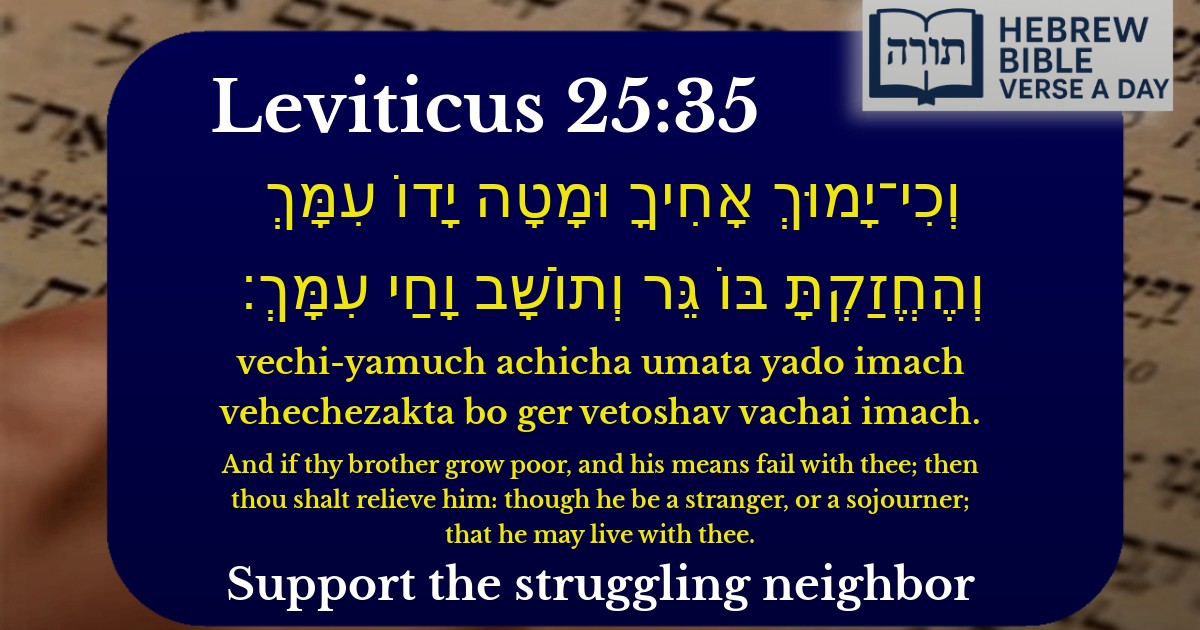Frequently Asked Questions
Q: What does Leviticus 25:35 mean?
A: Leviticus 25:35 teaches the mitzvah (commandment) of helping a fellow Jew who has fallen into poverty. The Torah instructs us to support our brother ('achicha')—meaning another Jew—when he struggles financially, so he can continue to live with dignity. This includes providing loans, gifts, or other assistance to help him regain stability. Rashi explains that the phrase 'and his means fail with you' implies that we must strengthen him before he completely collapses financially.
Q: Why is helping the poor important in Judaism?
A: Helping the poor is a fundamental Jewish value rooted in this verse and many others. The Rambam (Maimonides) lists tzedakah (charity) as one of the highest forms of kindness, especially when given in a way that preserves the recipient's dignity. The Talmud (Bava Metzia 31a) emphasizes that we must not ignore a fellow Jew in need. The Torah here stresses that even a 'ger' (stranger) or 'toshav' (sojourner) must be supported—showing that our responsibility extends beyond close family or friends.
Q: How does Leviticus 25:35 apply today?
A: This verse remains highly relevant today, teaching us to actively assist those facing financial hardship. Halacha (Jewish law) requires us to give tzedakah according to our means and to offer interest-free loans if possible (Gemilut Chasadim). The Shulchan Aruch (Yoreh De'ah 247) details practical laws of charity based on this principle. Additionally, the verse reminds us to help with sensitivity—'that he may live with you' implies supporting others in a way that maintains their self-respect and avoids shame.
Q: Who is considered 'your brother' in this verse?
A: The term 'your brother' ('achicha') in this verse refers to any fellow Jew, as explained by Rashi and other commentators. However, the Torah also includes 'ger' (a convert) and 'toshav' (a non-Jewish resident living among Jews), teaching that our obligation extends to those closely connected to the Jewish community. The Sifra (a halachic Midrash) clarifies that priority is given to helping fellow Jews first, but kindness must not be withheld from others in need.
Q: What does 'strengthen him' mean in this verse?
A: The phrase 'you shall strengthen him' ('vehechezakta bo') means providing support before a person reaches complete destitution. Rashi explains that this includes giving assistance in a way that prevents further decline—such as offering a loan, a business partnership, or a job. The Rambam (Hilchos Matnos Aniyim 10:7) teaches that the highest form of charity is helping someone become self-sufficient. This aligns with the verse’s emphasis on helping others 'live with you'—restoring their independence rather than creating dependency.


Verse Context and Meaning
The verse (Vayikra 25:35) addresses the obligation to support a fellow Jew who has fallen into financial hardship. The Torah emphasizes the importance of assisting one's "brother" (אָחִיךָ) when his "hand falters" (וּמָטָה יָדוֹ), ensuring he can continue to live with dignity. The inclusion of "גֵּר וְתוֹשָׁב" (stranger or sojourner) extends this responsibility even to non-native residents, reflecting the broader ethical imperative of compassion.
Rashi's Commentary
Rashi explains that the phrase "וּמָטָה יָדוֹ עִמָּךְ" ("his means fail with thee") implies that the individual's financial decline is relative to his previous standing—meaning one must assist according to the person's former standard of living. Rashi also notes that the term "וְהֶחֱזַקְתָּ בּוֹ" ("then thou shalt relieve him") means providing support before the person becomes completely destitute, either through a loan, partnership, or gift, depending on the need.
Rambam's Perspective
In Hilchos Matnos Aniyim (Laws of Gifts to the Poor 10:7), the Rambam elaborates on this mitzvah, stating that helping a fellow Jew in financial distress is a positive commandment. He emphasizes that one must give in a way that preserves the recipient's dignity, ideally through anonymous assistance or by offering employment rather than outright charity if possible. The Rambam also highlights that this obligation applies even to a "ger toshav" (resident alien), reinforcing the universal value of kindness.
Talmudic and Midrashic Insights
Halachic Application
Shulchan Aruch (Yoreh De'ah 247:1) codifies this mitzvah, ruling that one must provide assistance in a way that restores the individual's self-sufficiency. The poskim further discuss whether priority is given to relatives or local poor, but all agree that the overarching principle is to act with compassion and urgency.
Ethical Lessons
This verse underscores the Jewish value of tzedakah (righteous giving) not as optional charity but as an obligation to uphold human dignity. The inclusion of "גֵּר וְתוֹשָׁב" teaches that kindness extends beyond familial or communal bonds, reflecting the Torah's universal concern for those in need.